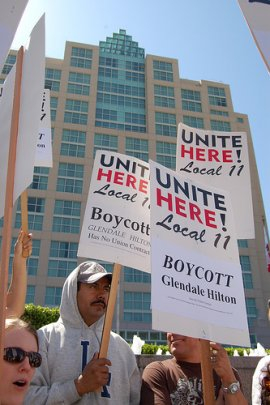The situation in Glendale
The situation in Glendale ground along for years, with management betting that workers would tire of the tense environment. It is obvious.




The first contract signed June 4 at the Hilton Hotel in Glendale, California is nothing to sneeze at these days—modest raises, health care costs cut in half, and relief from a crushing workload.
But its significance for hotel workers struggling to lift standards nationwide is even greater. In September 2005, the Los Angeles-area Hilton was where UNITE HERE launched its Hotel Workers Rising campaign.
In an era when many unions rely on one-shot strategies, the national drive was remarkable for using aggressive contract campaigns at existing union strongholds to build momentum and to demand neutrality rights for drives at unorganized hotels. The campaign drew on a wide range of tactics, from lining up contract expirations to striking to sitting in at hotel doors.
The Glendale deal means far more than organizing numbers or dollars and cents to Angela Reid, a bartender who became a spokeswoman for Hotel Workers Rising as she toured the country speaking at rallies.
“I kept saying to myself, it’s going to happen any day now,” she said. “Any day now turned into three-and-a-half years.”
By that time Reid and her co-workers had beaten the hotel decisively, wearing down management through an intensely organized inside campaign and boycott that drove out one owner and brought in a second eager to call a truce.
Workers at the Glendale Hilton didn’t wait to win their union before acting like one. For more than a year, a 30-member core committee met weekly in secret, preparing for the public launch of the campaign.
That came with a delegation of 70, including local politicians and clergy, who confronted the general manager and demanded card-check neutrality. (Card check brings in a union when a majority of workers sign cards saying they want one).

Give $10 a month or more and get our "Fight the Boss, Build the Union" T-shirt.
“From that day on the whole hotel changed,” Reid said. “It wasn’t even the same hotel anymore.”
Security cameras went up, and long lines formed at the employee entrance as a private security agency set up a metal detector and searched bags.
The heavy-handed tactics backfired. When cooks showed up at the barricade, the security guards panicked. No one had told them that kitchen staff had to purchase their own knives and carry them into work every day.
Little indignities piled up, and management lost control as workers organized into dozens of micro-committees by job task or site. They took over captive-audience meetings, and formed delegations of 30 or 40 that besieged the general manager constantly, demanding that a decision be overturned or an aggressive junior manager be reined in.
They beat back an attempt to add more glasses in hotel rooms, and won a drop in housekeepers’ daily room-cleaning load, from 16 to 15. Management tried playing nice to de-rail the campaign, sweetening paychecks by 50 cents an hour and offering a promotion to a cook, a key leader in the kitchen. He didn’t bite.
“The leaders were in the forefront, training workers to be organizers,” said Bethany Holmes, lead organizer at the hotel. “It got to the point where we didn’t have a lot of staff on it because the leaders were pushing each other.”
But the local fight wasn’t enough to win. Although UNITE HERE had signed a national neutrality agreement with the Hilton corporation in 2006, it only applied to sites Hilton actually owned and operated. The Glendale Hilton was owned by Eagle Hospitality, which controlled 12 other hotels across the country.
UNITE HERE launched a boycott of Eagle properties and pickets went up in front of the Glendale hotel each week, attracting 30 to 100 workers. Soon, Glendale was exporting its picketers to five hotels around the Los Angeles airport where organizing drives had surfaced. Four of those would settle in 18 months, except for the airport Hilton, where the owner lives in the hotel and continues to stage a nasty fight.
The situation in Glendale ground along for years, with management betting that workers would tire of the tense environment. Meanwhile the boycott gradually chipped away the hotel’s lucrative conference business.
Organizers credit the union’s deep-relationship model of organizing, which slowly builds intensely personal connections, for allowing the campaign to persevere.
Those tight bonds kept people from falling away at Glendale, giving the boycott time to starve Eagle of what the union estimates was $1 million. Eagle was swallowed in a merger last fall and the new management came with an offer: card-check neutrality in exchange for an end to the fight.
Within four days about 85 percent of the Hilton’s workers had signed cards and ushered in a new day.
“There’s no tipping point, just the cumulative effect of putting pressure,” said Mark Westerberg, a Glendale bellman for four years who joined UNITE HERE as an organizer after the campaign. “We made it obvious that they were going to have a union whether they liked it or not.”
The situation in Glendale ground along for years, with management betting that workers would tire of the tense environment. It is obvious.